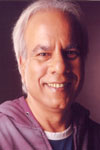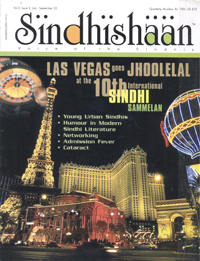THE SWORD OF A SINDHI SAHITKAAR
By Arun Babani

The world is divided into two categories; the creators and their critics. A newspaper editor was speaking on the feedback he receives in his paper; “If no one speaks about you, know well that you have been appreciated. There are lengthy and hostile letters about how a particular writer is undeserving or churlish, or whatever; but when it comes to a good piece of literature, Sindhis prefer – silence is golden
Over the years one has attended events like Writers’ Seminars, Literary Samelans, or been a part of Writers’ Meets and son. What one notices is that a Sindhi writer is a breed apart, a sort of a queer species which is partly blind and hard of hearing when it comes to essentials, and a voracious speaker on others’ ills and his own frills.
A typical Writers’ Seminar would go something like this : a writer would read a paper, no matter on what subject, maybe something like “Vedanta in Sindhi Verse.” The writer, upon finishing his heavyweight dissertation, would sit down on his wooden chair, wiping his face with a handkerchief, and immediately ten hands would go up in the assembly for other writers to come and ‘analyse’ the work. This would be followed by an array of fireworks, blood would flow, blood pressures will run high, and suddenly the microphone would be redundant! There is a bell kept on the dais, the purpose of which is to cut short the writer ‘analysing’ the other writers’ work. But its ringing falls on deaf ears.
A typical Sindhi writers’ meeting will be held in some editor’s office, where half a dozen have gathered to chart out a personal game plan. It begins with an attack on a fellow writer not present. This done, tea is served and business at hand is handled. One of the writers has to leave, and on his exit, the remaining writers tear him to bits and pieces, with blood all over the palce. This done, two others leave together, and the three behind settle their old scores, wither with each other or with the ones that have just left! Is this the camaraderie of Sindhi writers or is it a comedy? A typical Writers’ Samelan is a big fight Samelan. It is a place where important functions and awards are dished out, so naturally violence is manifold, and wounds are doled out by the dozens. Traditionally a Writers’ Sammelan used to be a cultural song and dance thing, but behind the curtains a ferocious song and dance goes on about who’s getting what post and how much in awards. This led a Sindhi cartoonist to draw cartoons of Sindhi writers with stones in their pockets. Same is the case with private gatherings of Sindhi writers. Any occasion is good enough to punch each others’ nose, and throw dirt at each other. And is if all this was not enough, all Sindhi publications carry venomous pieces by one writer against the other in the name of critical analysis, as a kind of settlement of personal scores with each other. Naturally, for a Sindhi writer, the pen not only seems mightier than the sword, but it is the sword itself!
There was a time soon after partition when there was a strong network of Sindhi writers, all living in close proximity and having day to day contact. Everyone knew everyone else and the mutual respect and ‘brotherhood’ was imminent. It was clear to them that they were a small and scattered community, and their survival depended on the community feeling they gathered amongst each other. So they played together, danced together, and in some cases even lived together. There were differences, but love was above all; the love for Sindh, the love for Sindhis, the love for art, and the love for each other. In those days of the 50s, 60s and 70s, this feeling of love and brotherhood among the Sindhi writers was what kept them going, despite the empty pockets, and surprisingly, they came out with some rare insights into the Sindhi soul. Today however, a strong feeling of competition and one-upmanship is discernable among the newer generation of Sindhi writers.
Today’s one-eyed Sindhi writer has an eye for a quick buck and instant fame; he perceives great mileage in hurting others. And today in the times of government funding, anybody and everybody is a Sindhi writer, and people are writing not one, not two, but there or four booklets at a time, and sending them free and at times even getting paid for it.
So should you say Chee! Chee! or Wah! Wah! for a Sindhi writer? You dicide!


